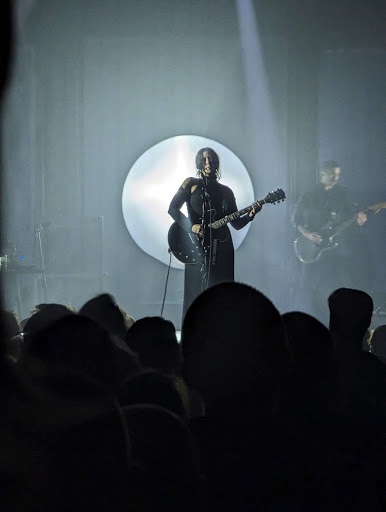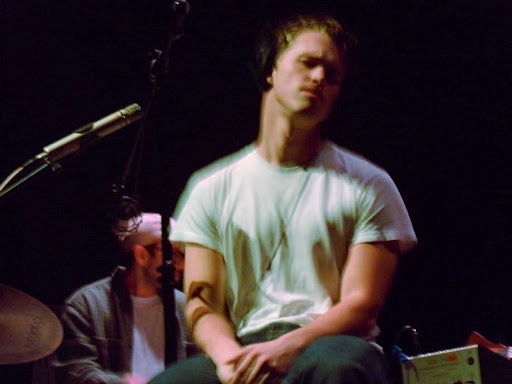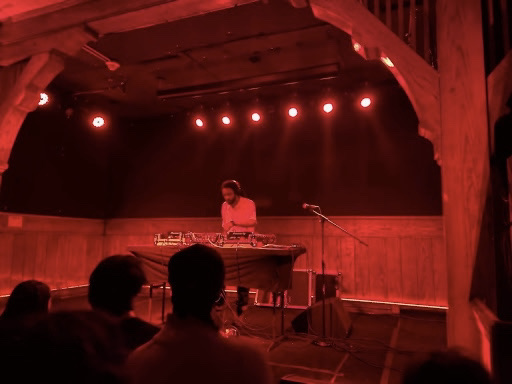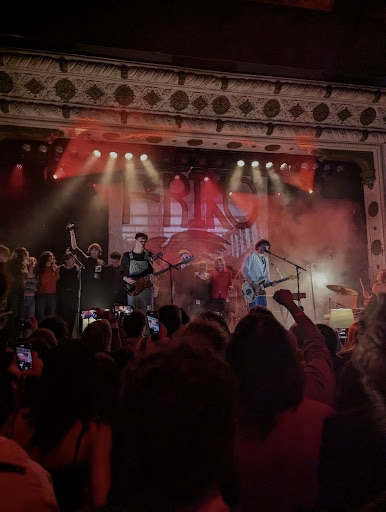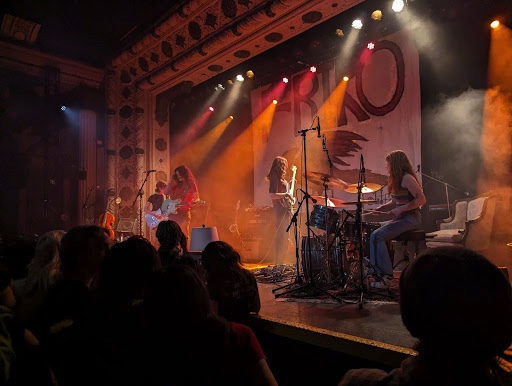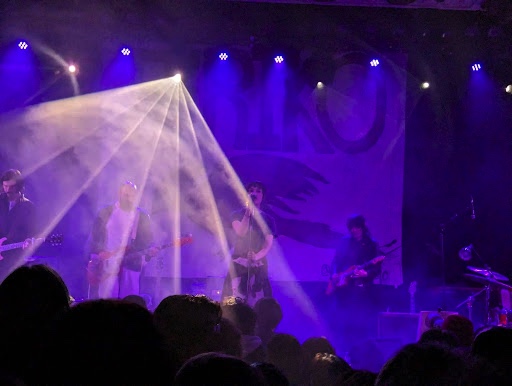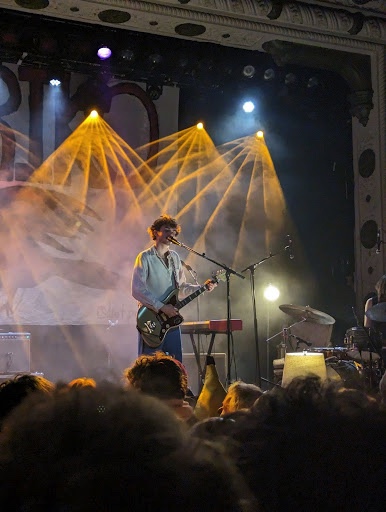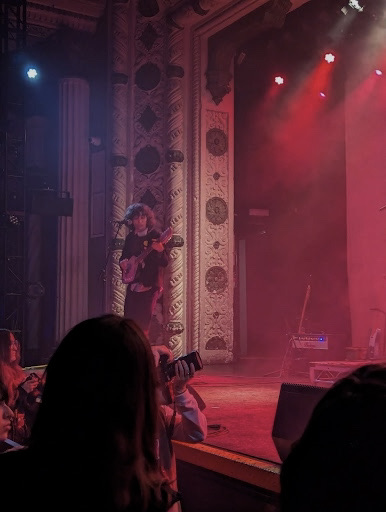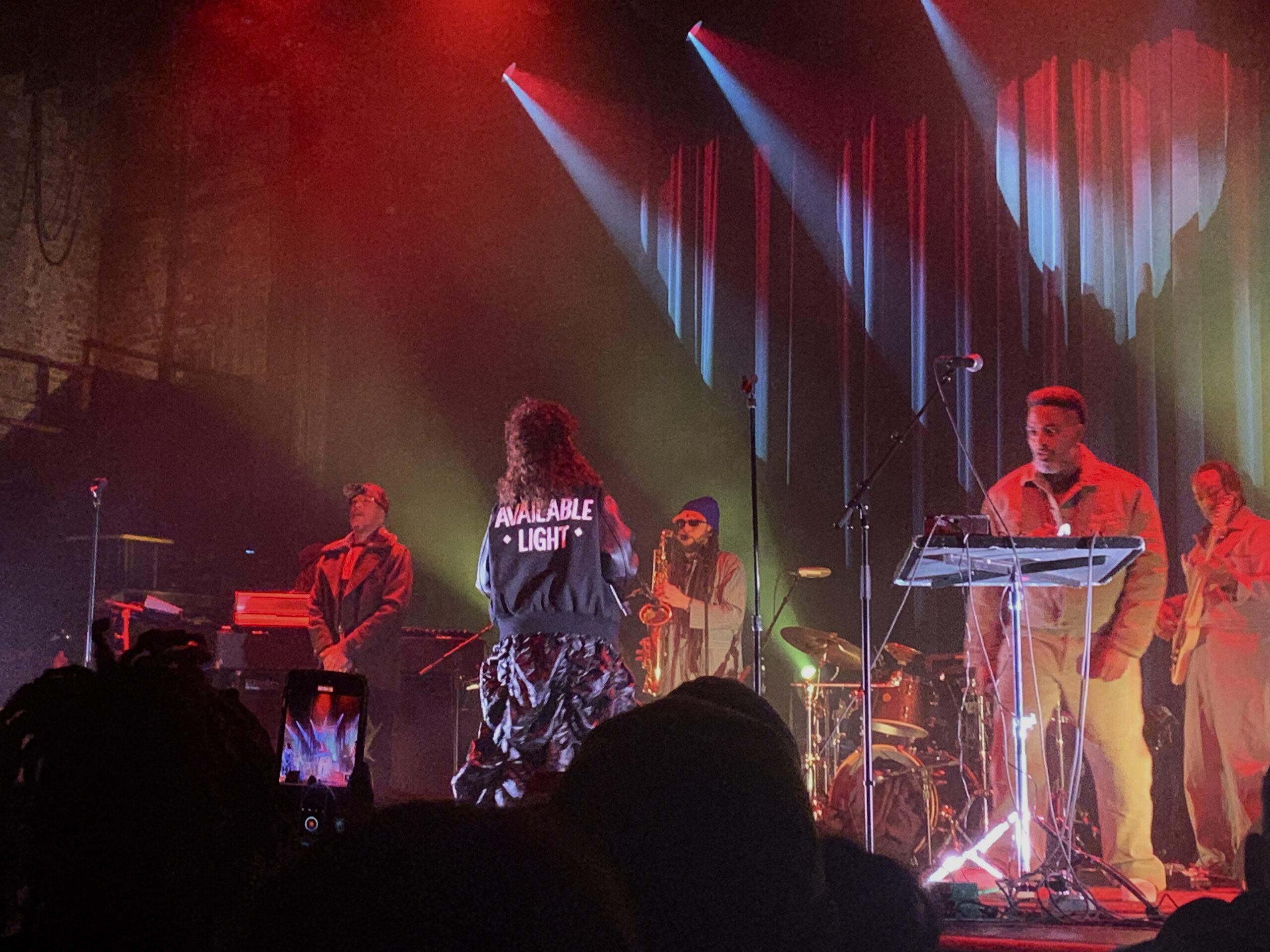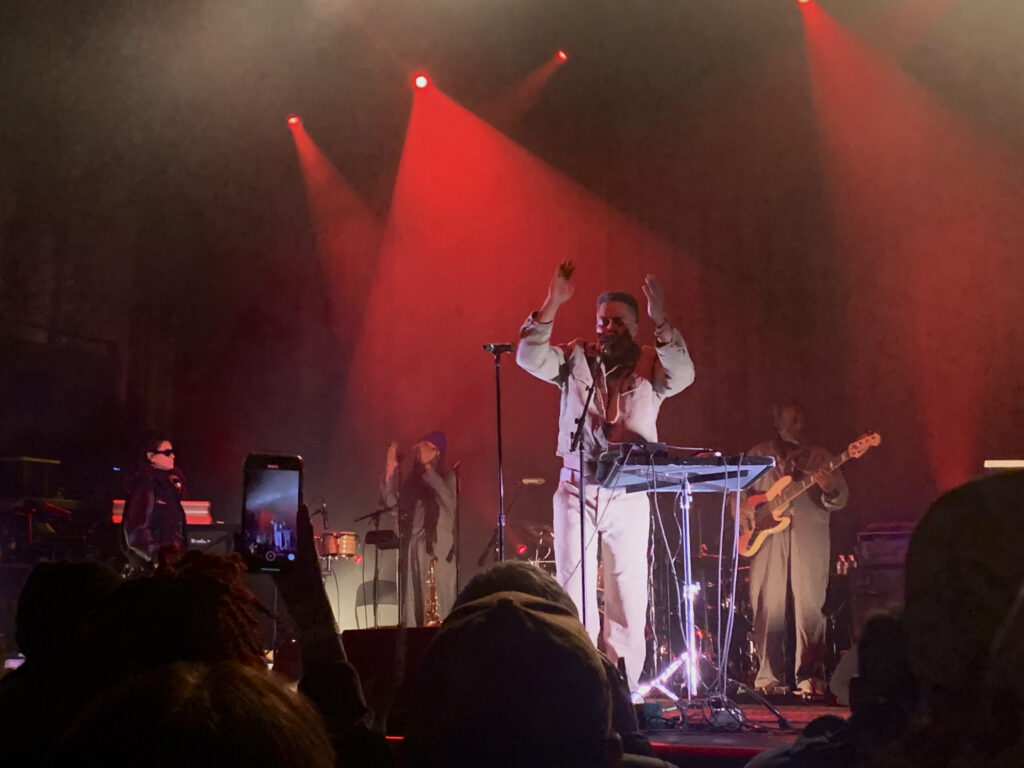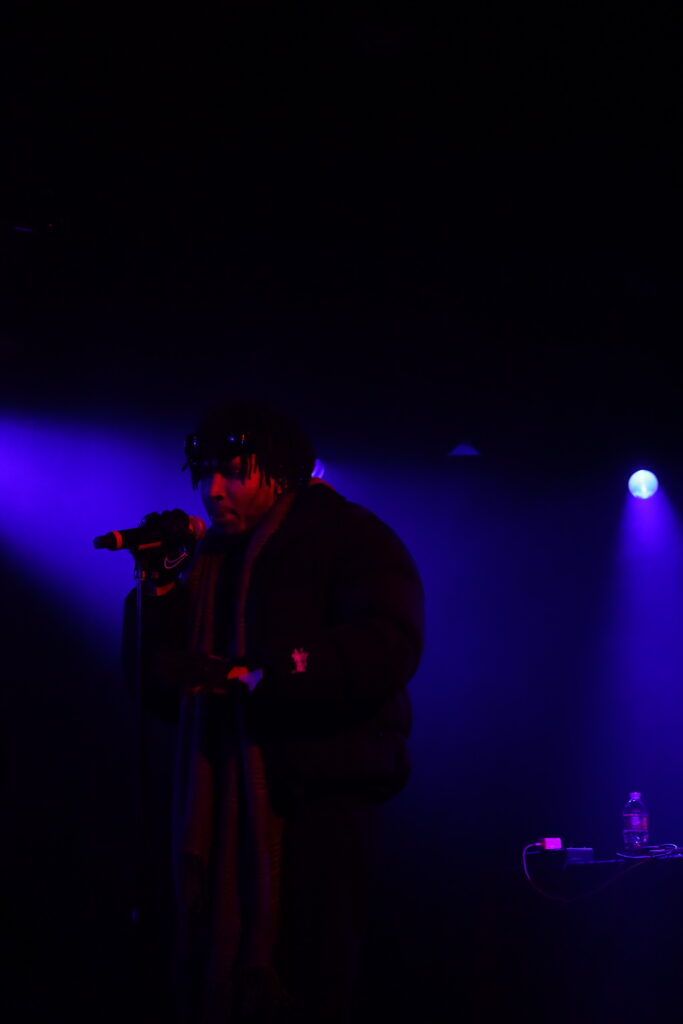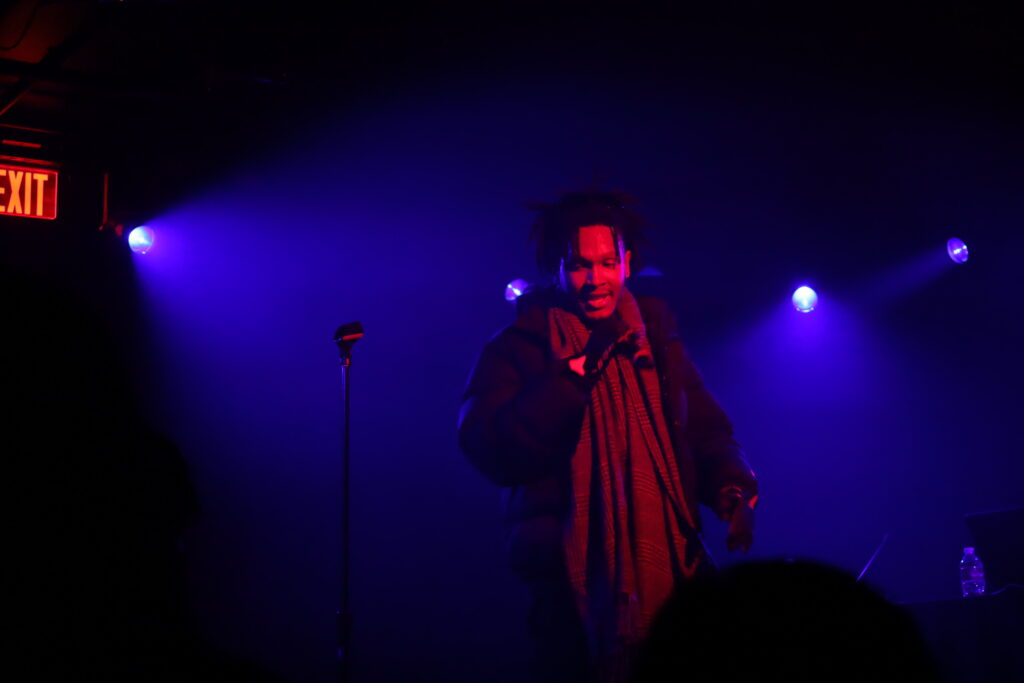CHICAGO | At a recent show at Schubas Tavern in Chicago on February 3, the acclaimed DJ Gum.mp3 mesmerized attendees with an energizing performance deeply rooted in the essence of Jungle music. With a profound appreciation for the past and a vision for the future, Gum.mp3 skillfully amalgamates influences spanning from House Funk and Soul to Drum & Bass, Jungle and more within his set. Through seamless blends and crafted transitions, Gum.mp3 curated a captivating sonic experience, inviting listeners to immerse themselves in a realm where the pure essence of musical expression was present.
Nora: First off, I saw that you’re from rural North Carolina, and I am as well. I’m from Boone, it’s a college town. Where are you from?
Gum.mp3 (DJ): Okay. I’m not gonna dox myself. I’m from near Gaston area.
Nora: I was wondering if just growing up in rural North Carolina has had any impacts on you perhaps musically or even personally?
Gum.mp3: Not so much musically. Mostly though because I grew up listening to a lot of Southern rap music, like gangster rap music. I don’t make rap music, obviously, but I’m friends with a lot of rappers and I have a really high respect for the craft on a literary level. It was because I grew up on it, but also because my ideas about it were complicated after I learned more about art in college. I came to appreciate it in a different way than I did as a kid. Being a fan of rap music over the last 26 years has definitely changed how I engage with music in general.
One of my friends said something interesting a couple of weeks ago. He was describing and was like, Yo, rap music is all about cinema, he says, cinema, literature, and rhythm. I was like, you’re so right. I was like oh my God, you’re so right. Just being able to come to conclusions like that and being able to talk about the music at a higher level, I think it definitely comes from my passion for rap music. I can kind of extend that to other genres.
Being a Southerner has definitely influenced all my politics and I try to bring it up as much as I can because I feel like Southern radical politics aren’t as represented as much outside of like conservative extremism in the south. Right? But southern leftism is not really talked about as much or not even just leftism, any kind of radical Southerness that’s not conservative isn’t really talked about as much.
So I try to make it a point every time I talk about my political stances because especially, you know, I’m big into technology. I think the way that Southerners relate to the rest of the world can be related to by the global South heavily. I think we both share some of the same issues and some of the same obstacles.
And just the idea of Southerness as a political location, too, I think it’s interesting. And the way that southern areas globally have a similar political history. There’s always like a north-south divide for some reason. That’s something I think about a lot and it’s something that is embedded in all my politics.
Ellie: How did you get into deejaying? Did you start with deejaying in mind? Like, as your first intention, or did you start with a different genre or a different project and then it just kind of morphed into that?
Gum.mp3: Yeah, I started out making weird ambient and electro-classical music because I was trying to do my best Ryuichi Sakamoto impersonation. I had just been listening to Async for the first time, this was college, like 2018, my junior year. All my friends were making rap music and like, kind of weird electronic music and I was like, okay, I’m not gonna be a rapper. I can’t do that. I don’t have the personal charisma to go on stage rapping, so I’m not gonna do that. But I will make some weird electronic music.
So I was doing that for a while and then I got into Moodymann, Fred P. And I was like, let me just start making house music. My dad loves house music. He grew up in Baltimore, so, you know, I never really got in the house like that outside of Daft Punk and stuff and some of the classics like Percolator. It’d be tracks I would hear that I know from like a kid, but it didn’t click to me that it was house music. Until I started listening to it and making it and, you know, becoming a student of it.
And then deejaying happened by accident because then the pandemic, my music, you know, people will listen to my music a little bit more. And then one of my homies from the Harvard radio station was like, Yo, you wanna do one of those online events for us, can you deejay? I was like, You know, I’m not gonna pass up no easy money. So I’m not gonna say no I can’t deejay, and miss out on the bread. So I was like, yes, I can deejay. And I bought a controller and learned how to deejay in like two weeks. Did my little mix, and then, I picked it up from there.
I was like, Yo, let me just get better. I got to keep doing this. I got to keep doing these virtual sets. I got to keep getting this money. So a little bit less, less glamorous motivation process. But by that point, I was pretty good at making house music, so I kind of understood how to mix it.
I think what held me back from learning to deejay beforehand was that I had a controller, but I didn’t really understand fundamentally how to mix, especially rap music, especially non-modular music. It was harder for me to figure out how to beat match because it just didn’t make sense in my head yet.
But house music, you know, it’s like Legos. You got four on the floor, everything else is different, so it’s pretty easy to be matched. And then from there I got better at mixing just in general, and I got better at production because I understood the intricacies of deejaying a little bit more.
There’s definitely a kind of give and take relationship with the deejaying after that. But yeah, initially yeah, somebody asked me if I could deejay a live and I had to learn so I could back it up.
Nora: Who would you consider to be your biggest inspirations?
Gum.mp3: Moodymann. Moodymann Again, Fred P, Ryuichi Sakamoto again. DJ Screw, the legend. I think that’s about it. Big on the Moodymann, though, that’s my goat. I Well, I’ll talk about him in every interview I have just because I want him to get wind of it one day, and be like who is this guy who keeps talking about me. So I will keep doing it til’ it works.
Ellie: What was the process like making your latest collaborative album, Girls Love Jungle.
Gum.mp3: Girls Love Jungle. Me and Daze worked on that for two years. We made the first two tracks Bad 4 Us and Thinking About U two years ago, and we kind of worked on some tracks, ‘bout a year after that, and then it took us another year to kind of finish it up and really settle on the idea, get the art done and stuff.
It was really straightforward, it was much more exciting when it happened than it is like, hearing me talk about it because really all that happened was I made a couple of loops, I sent them to Daze, Daze went crazy, and then we ended up with some songs. But in between that, you know, we spent a lot of hours on Discord talking to each other and co-producing together.
Daze is a masterful drum programmer, so I really didn’t have to do much. I just have a different taste in samples and melody than he does. I feel like Daze has a more, I be describing it as like candy coated, like in the area of trance music and hardcore, which is fundamentally very different from my kind of more jazzier taste. I’m definitely more of an old school taste in melody, like ninth chords and seven chords and a really long, kind of slow melodies, jazzy melodies, really funky basslines with emphasis on the down beats and stuff.
So it’s a little bit different from Daze’s taste. You know, he’s a Junglist. He’s also Jamaican and Ghanaian. We’re approaching bass culture from two very different geographic locations. He’s approaching it from this kind of Afro-Caribbean lineage, and I’m approaching it from this kind of blues and funk lineage and, you know, obviously it’s all related, but we’re already doing it kind of in our own individual, idiosyncratic ways. But then when we do it together, it becomes even more of an interesting kind of fusion.
But we work together really well. Daze’s one of the only people who works as fast as I do. I can send him a loop, and he’ll have like a whole track in the next two days. So it was really quick. The album was done forever, like a year before we put it out. I was like Yo, we have got to get the album cover, we got to mix it, and put it out, bro. We’ve been sitting on it for too long. So I’m just glad we finally got it out. People were dying for it. And I kept telling people it was done too, so everyone was like, Yo, when are yall gonna put it out? I was like I don’t know? When are we gonna put it out?
Ellie: Do you have a musical education background?
Gum.mp3: My friend, Justin, taught me everything I know about Ableton. When I was in college, I watched and learned from him. And then from there I went on to develop my own methodology. But I was a STEM kid growing up.
My mom had me in all these science and math programs. I played hella sports. I played sports every season and I did STEM camps in the summer. So it was nothing really about music or art ever, until my last year of high school, when I decided I wanted to go to art school.
Nora: So you got into music in high school?
Gum.mp3: I got into music my last two years of college. I got into art in high school, my last year of high school and I applied to NYU. I applied for computer science everywhere else except for UPenn and NYU, for art. UPenn was visual art and then I applied to NYU for cinema studies. I thought I wanted to make movies and I got to NYU and I was like, Wait, I don’t want to make movies, I want to be a film critic. So I did cinema studies for a year and I was like, Wait, I don’t want to do this either. I actually do want to make stuff but just not movies. So, I switched to the art program and I was like, Wait, okay, I like this, but what if I started doing music too?
So really it was me not really knowing what I wanted to do. I found something that I was kind of not even good at yet, but I thought I might be able to do some sort of agency. That’s what attracted me about being an artist, was a sense of agency and being able to, like, make a living, doing what I want to do.
This feels kind of selfish to say out, but it was more just like, Yo, I need my political agency and my economic agency. I need to be able to wake up whenever I want and do whatever I want and not in an irresponsible, selfish way, but we all deserve this kind of, like, agency to choose.
I didn’t want to just do computer science because I liked it and because it made money. Because all my experiences in STEM, that were job related, or were workforce oriented, I was like, this makes me not like it. I’m into a lot of the underbelly of technology. So it didn’t interest me doing the top side of it just because they made a bunch of money. It didn’t sit well with me politically either. So it caused a bunch of strife for my mom, because she was like, Yo, you’re so smart, then you go to school for art. Like, why are you doing that?
I was like, I mean, I don’t know. I don’t know either. You know, I’m doing this so I can figure out why I’m doing it, I guess. It was more of an exploratory experience, anything. I’m just glad it worked out.
Nora: That’s really awesome, because STEM and art are definitely two opposite ends of the spectrum, I’d say. But that’s really cool that you were into both of them.
Gum.mp3: Yeah I think I was lucky. Honestly, I was lucky to have a black art teacher. If I didn’t have a black art teacher, I don’t think I would have been interested in it. But he was like, Yo, you got good ideas, you got an interesting way of seeing the world. Like, you should try it. You should give it a shot.
It’s not that I wasn’t challenged in school, it’s just that my mom held me to such a crazy high standard that by the time I got to high school, bro, I had been getting perfect grades forever. I had been playing sports forever. I had been good at school forever. Art was the first thing I had tried to do and I was bad at. And I was like Yo hold on. I was like, I don’t want y’all to catch me lacking. Like, Y’all not ‘bout to say I’m a bad artist, so let me cook. Let me get right. Let me get my shit together so I can say I can do that. So there’s definitely a bit of ego involved, but I think I’ve mellowed out towards the end. And now I’m a little bit more philosophical about it.
Ellie: What else do you like to do in your free time other than like, I guess your job is making music now?
Gum.mp3: I like playing video games and riding my mountain bike. I used to like taking road trips. So when Wagenmuzik came out is when I first bought my BMW and then this year it broke down like four months ago. And I’ve been fixing it on and off for like the last year.
So now that my car is, you know, in hell, basically I’ve been riding my bike a lot. So now I’m big into cycling, I’m back on the bike, I ride my mountain bike. I’m doing like five miles, ten miles a day. It’s been a lot of fun. Virginia is a good place for it, too. There’s nothing to do, but it’s beautiful. So I like to ride my bike around and go to different trails and stuff, come home, play some video games, work out, read. I’ve been reading a lot of books.
Life’s kind of mellowed out for a little bit now. I got things I do, got my little schedule. I make time to play video games, make time to read, and I make time to catch up with my friends.
Ellie: Anything else you want to talk about?
Gum.mp3: Yeah, I got an album coming out. My next album, my solo album is called Black Life, Red Planet, on March 7th. And then the release party in New York at Elsewhere on March 9th with my friend Niontay, the brilliant rapper.
Ellie: Do you have a lot of release parties for your stuff?
Gum.mp3: Nah, I did my first one last year for Riddim Seeker, my EP with Ghostly. I had a release party for that and it was on my birthday, I think. That was sick, that was fun! But before then, I couldn’t afford to have a release party, and I didn’t have the fan base either to do it really at least not all in one city where I can go then and do a release party.
So it is this year and last year my first time really doing proper release parties. I think this will probably be the biggest definitely.
Ellie: Are you excited for this show? Because we saw it was sold out.
Gum.mp3: Yeah. So I was surprised by that. I was like Okay! I didn’t think it was gonna do all that. I knew people was gonna come. I didn’t know it’s gonna be like that. So I’m excited, I’m glad that Chicago is excited for my music. It feels good to be here during Black History Month. It feels good to deejay with another deejay who I respect. Zora, Zora is awesome.
It’s gonna be a good night. I’m glad to be here. I wish I could come more often. I want to play at Smartbar. So if anybody at Smartbar reads this, please let me deejay at Smartbar, that would be a dream come true. But yeah, I’m just hanging out, man, I’m having a great time, I love Chicago.
Nora: This is a great venue, too. I’d say it’s one of my favorites.
Gum.mp3: Yeah, it’s a cool place. It’s not small, but it’s not huge either. Yo, I made this point in a lecture. I was talking to somebody about the importance of mid-size venues. It’s so crucial for artists of my level, whereas, like, I’m not a superstar, you know, I can’t go sell out a 500 person room, but at the same time, a 70 person room isn’t profitable.
So it was like it sucks in places other than New York, because you got a small room, or a big room. I need a mid-sized room, where 150, 200 people can come in. So if 50 people invite a friend, that’s 100 people But 500 you go into debt that way? It’s nice to be here at a decently sized venue. Sold out, it’s gonna be fun and I can go home, and I’m not in debt. I don’t ask for two much, just let me split even.
If you’re interested in seeing Gum.mp3 live in Kansas, NYC, or Philadelphia or you’d like to listen to his new album, Black Life, Red Planet, check out his website https://gum.studio/. You can find his music on Soundcloud (gumskiiiiiii), Spotify (gum.mp3), Bandcamp (gum.mp3), Apple Music (gum.mp3), and Youtube (gum.mp3). All of these are linked on his website as well, along with links to buy tickets to his shows.

